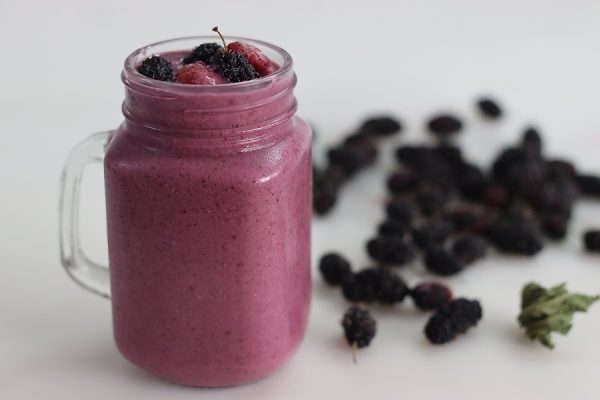I love fresh fruits and vegetables. They’re loaded with vitamins, minerals and antioxidants that are good for my health… and yours.
Eating fresh, plant-based foods is one of the easiest ways to prevent cancer. These foods protect against high blood pressure, heart disease, stroke and mental decline. They preserve your vision, prevent diabetes, keep you thin and support a healthy gut microbiota.
But there’s a problem. Here in the U.S., only one out of every 10 adults eat the recommended daily servings of fruits and vegetables. This means 90% of adults are eating less than the current guidelines of 1½ to 2 cups of fruit per day and 2 to 3 cups of vegetables.
This is tragic!
As far as I’m concerned, plant-based foods should be the foundation of your diet. And it’s not nearly as hard to start getting more fruits and veggies in your diet as you might think.
Boost Fruit and Veggie Intake with Homemade Smoothies
When you add a few extra servings of fresh produce to your diet on a daily basis, it can help you live a longer, healthier and more active life.
In fact, these life-giving foods can even SAVE your life. Research shows that 7.8 million deaths worldwide could be prevented each year if people did nothing more than eat more fruits and vegetables.
In addition to adding more fresh fruits and veggies to your meals, one of the quickest ways to get more plant-based nutrients from your diet is by drinking a smoothie every day. All you need is some fresh or frozen produce and a good, old-fashioned blender.
I like mixing some honey with almond milk. Then I throw in a handful of blueberries and a dark-green leafy vegetable like romaine or spinach. Sometimes I might include a heaping teaspoonful of ground flaxseed and some organic almond or cashew butter.
When I asked around the office to see what others put in their smoothies, there wasn’t a huge variation. Almost all of them started with a plant-based milk, then added blueberries or another type of fruit (like mango, pineapple or strawberries – fresh or frozen), along with a green food.
Some additional ingredients used included protein powder, chlorella, avocado, cacao nibs and a variety of seeds such as hemp, chia or flax seeds.
All of these are great choices!
The Do’s and Don’ts of Smoothies
When you make your smoothie correctly, it’s an easy way to get a protein fix; along with healthy fat, plenty of plant phytonutrients, and a hefty dose of much-needed fiber… while increasing your fruit and veggie intake at the same time!
One important thing to remember about smoothies is that you need to add dark leafy greens to balance out the sugar from the fruit.
Sure, an all-fruit smoothie, can be delicious. But it will have a lot more sugar in it. Even though it’s natural sugar, it can still have an effect on your blood sugar. By adding dark leafy greens, you’ll get more fiber and other nutrients that help offset those natural sugars. (Using whole, unpeeled fruits can also increase fiber to slow down sugar absorption.)
And remember. The nutritional value of a smoothie is going to be based on the ingredients you use. That means you don’t want to load it up with things that are bad for you. It shouldn’t look and taste like a dessert.
With that in mind, I recommend avoiding using ingredients like dairy milk, ice cream, frozen or flavored yogurt, sugar or sugar substitutes, fruit juice or canned fruit. They will all destroy any potential benefit of drinking smoothies.
All in all, the perfect smoothie is one that has the right balance of high-quality protein, non-starchy carbs and healthy fats.
SOURCES:
Boeing H, Bechthold A, Bub A, Ellinger S, Haller D, Kroke A, Leschik-Bonnet E, Müller MJ, Oberritter H, Schulze M, Stehle P, Watzl B. Critical review: vegetables and fruit in the prevention of chronic diseases. Eur J Nutr. 2012 Sep;51(6):637-63.
Aune D, Giovannucci E, Boffetta P, Fadnes LT, Keum N, Norat T, Greenwood DC, Riboli E, Vatten LJ, Tonstad S. Fruit and vegetable intake and the risk of cardiovascular disease, total cancer and all-cause mortality-a systematic review and dose-response meta-analysis of prospective studies. Int J Epidemiol. 2017 Jun 1;46(3):1029-1056.




